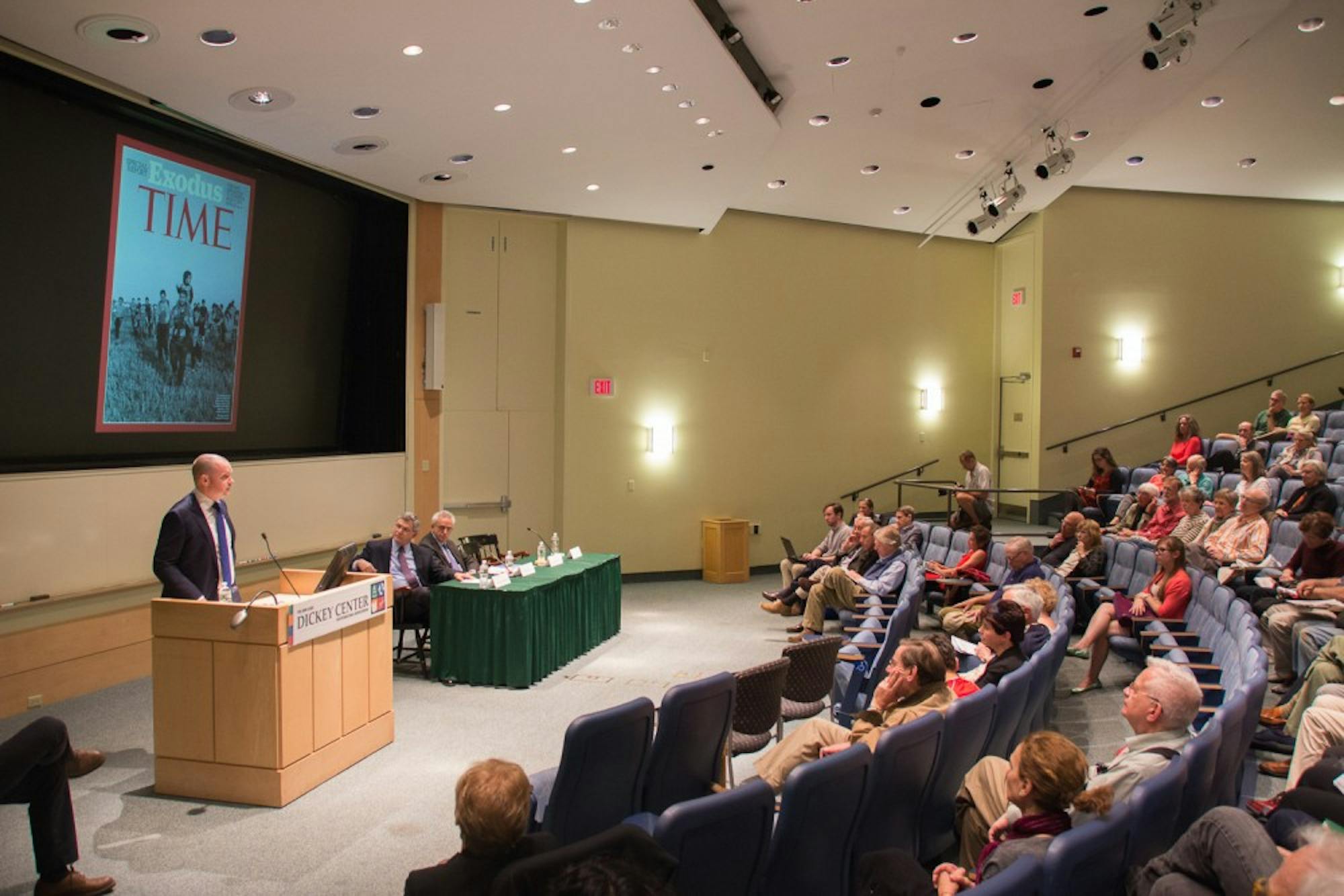On Monday, Oct. 12, the Dickey Center for International Understanding conducted a Humanity Uprooted panel to explain the causes and effects of Europe’s refugee crisis. The panel was held in Cook Auditorium in the late afternoon.
Dickey Center director Daniel Benjamin moderated the panel. He emphasized the importance of this event in helping Upper Valley residents and those affiliated with the College better understand Europe’s current refugees crisis.
“The story is everywhere right now, and it seemed like an event like this would be of great interest to students and community members in the Upper Valley who are trying to understand more what is going on and to think about what might make a difference in this context,” Benjamin said. “One of the responsibilities that we have as a Center is to highlight issues that are pressing and urgent, and I like to think the campus looks to us to do so.”
In addition to Benjamin, three speakers participated on the panel. These included Bob Kitchen, the International Rescue Committee emergency response and preparedness director; Michael Leigh, the former Director General of the European Union for Enlargement and Graziella Parati, the Leslie Center of the Humanities director and a migration scholar.
Kitchen spoke first and emphasized the ongoing nature of the refugee crisis, discussing the long-term causes that precipitated this current issue.
“It’s not a new crisis,” Kitchen said. “This is the result of protracted warfare and conflict in places like Syria and Afghanistan and Iraq. This is 10 years of suffering and people being uprooted in the face of large-scale conflict.”
Leigh said that though the situation can be traced to specific factors, its magnitude is significant.
“This crisis is of unprecedented proportions,” Leigh said.
He said that the European Union has the potential to curtail the consequences of the refugee crisis, though he does not believe that this is a guaranteed or blanket solution. He also proposed a strengthening in the EU’s system for migration and asylum issues, noting the need to tackle the root causes of political conflict and violence.
Parati concluded this discussion by offering statistics to supplement the information provided by Kitchen and Leigh. In 2015, 591,285 refugees arrived by sea in Europe. Of those, 3,095 were reported dead or missing.
Several students in attendance said that the discussion was enlightening.
Allyson Block ’19, who attended the panel, said that it offered greater insight into an issue with which she was relatively unfamiliar.
“I hadn’t known all that they discussed,” she said. “Obviously the crisis is in the news and talked about, but I wasn’t aware of any policies before coming. It was for my own edification, and I think this was very informative and also very horrifying. The numbers are shocking and powerful.”
Victor Cabrera ’19, who attended the panel, also found the discussion to be useful for developing a broader understanding of the issue.
“I realized there was a much greater complexity to the crisis than just getting to Europe,” he said. “All the problems you face after getting to Europe…a lack of funding, a lack of infrastructure. It gave me a lot more to think about.”
Benjamin said his goal for the panel was to educate and inform attendees, as well as to encourage them to take action.
“We hope that [attendees] come away smarter about the situation than when they went in, that they understand both more about the human dimensions of the crisis and also the political and institutional problems and that they can think about whether or not they are in a position to do more financially to help those who are helping refugees,” Benjamin said.
Parati also said that the panel was important because the refugee crisis is a global issue.
“I think that it’s important to always be informed about what’s going on in the world because there are no real separations,” she said. “Something that happens in Europe or in Africa or Asia always has repercussions all over the world, including the United States, of course.”
In January, Dartmouth intends to invite scholars of refugee and migration studies to speak, Parati said. The College is also working toward accepting refugee students, she said.
“In having this initiative at Dartmouth to bring in some other refugees, I wanted people from the community and from the College to be involved [through the panel],” she said.




